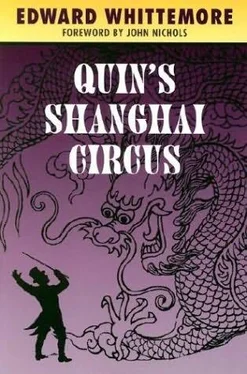Edward Whittemore - Quin’s Shanghai Circus
Здесь есть возможность читать онлайн «Edward Whittemore - Quin’s Shanghai Circus» весь текст электронной книги совершенно бесплатно (целиком полную версию без сокращений). В некоторых случаях можно слушать аудио, скачать через торрент в формате fb2 и присутствует краткое содержание. Жанр: Фэнтези, на английском языке. Описание произведения, (предисловие) а так же отзывы посетителей доступны на портале библиотеки ЛибКат.
- Название:Quin’s Shanghai Circus
- Автор:
- Жанр:
- Год:неизвестен
- ISBN:нет данных
- Рейтинг книги:3 / 5. Голосов: 1
-
Избранное:Добавить в избранное
- Отзывы:
-
Ваша оценка:
- 60
- 1
- 2
- 3
- 4
- 5
Quin’s Shanghai Circus: краткое содержание, описание и аннотация
Предлагаем к чтению аннотацию, описание, краткое содержание или предисловие (зависит от того, что написал сам автор книги «Quin’s Shanghai Circus»). Если вы не нашли необходимую информацию о книге — напишите в комментариях, мы постараемся отыскать её.
Quin’s Shanghai Circus — читать онлайн бесплатно полную книгу (весь текст) целиком
Ниже представлен текст книги, разбитый по страницам. Система сохранения места последней прочитанной страницы, позволяет с удобством читать онлайн бесплатно книгу «Quin’s Shanghai Circus», без необходимости каждый раз заново искать на чём Вы остановились. Поставьте закладку, и сможете в любой момент перейти на страницу, на которой закончили чтение.
Интервал:
Закладка:
I waited. He hadn’t had a headache all weekend and I could see he was worried he might have one now, before he could say what he wanted to say. But some things can’t be hurried. We’ve always been very close, the two of us, even though we seldom discuss personal matters. It’s the way it was in our family, I suppose. When I wrote to him from Jerusalem that I was converting to Judaism, he never asked me to explain myself although it naturally meant trouble for him in the army. He would have to work twice as hard in order to make up for having a brother who had embraced a Western religion, and not only embraced it but been ordained a teacher. Still he never questioned what I had done. His answer was to congratulate me and wish me happiness.
The tea ceremony, he repeated now. She turned the bowl three times because that’s the way it’s done. Well, brother, there are three of us again.
I’m glad, I said. Who is this woman you love?
She’s from a peasant family in the Tohoku.
They know a hard life.
She’s nearly thirty years younger than I am. She was a prostitute.
No matter.
From childhood and for many years.
No matter.
She’s known ten thousand men.
The number of creatures placed on earth by the Lord. In that case she understands many things and can love you well.
I’ve thought of asking her to marry me.
If you asked her, of course she would because she loves you, but is that best? She would be doing it only for your sake. If anything happens to you in the army the lands in the north would become her responsibility. Is it fair to make her the Baroness who owns the lands of the tenant farmers from whom she came?
I think not.
Rabbi Lotmann paused. He looked in silence at Mama for a moment.
That was as far as we got that afternoon. A headache struck him and he could say no more. I helped him into his car and he left. Do you remember that soon after that, in January 1932, he was away for a few weeks?
Yes, she answered.
Did he tell you where he went?
No.
It was Shanghai. A cousin of ours who lived in Shanghai was killed while he was there. It was an accident that he was killed but not an accident that he was attacked. My brother gave the orders, acting on higher orders. That was what he meant that day in December when he kept referring to doing what had to be done. He was thinking about that special assignment in Shanghai the following month. He wanted to tell me about it but couldn’t because of the headache.
I don’t understand. Surely he could have refused the assignment or even stopped it by saying a cousin of his was involved.
It seems to me he could and that’s what worries me.
Did he tell you about this later?
No. I suppose that after it was over he didn’t want to talk about it. I know about it because of the nature of his work, and because he had gone to Shanghai secretly, and because of the circumstances of what happened there.
I don’t understand any of it.
As far as that one incident is concerned, it doesn’t matter. As for the rest, I don’t understand it myself. I only have a feeling he may be something more than just an army officer.
I don’t know what that means.
Nor do I. But if there is anything I can ever do for you, or anything Adzhar or Lamereaux can ever do for you, you must come to us. They are close friends and you can rely on them as you would on me. That’s all. That’s why I wanted you to come today. To tell you that.
Thank you, she said. And thank you for what you said when he asked you about marriage.
He knew it himself, said Rabbi Lotmann. It was just his way of telling me the old koto had found a baroness again. I’ll be sending it to you now. I’ve had that in mind for a long time, but first I wanted to hear you play it with me. I’ve always been sentimental, I’m afraid.
He laughed as he opened the car door.
We’ve heard that tale of Adzhar’s many times, you know, many many times. He always has to tell it whenever I’m playing or Lamereaux is doing a scene from a No play. He’s an active man and it’s his way of taking part. He can’t abide being just a spectator. Today it wasn’t quite the same, though. For some reason he left out the last line.
And what is that?
A little trick of his that’s supposed to prove the tale’s authentic. At the end he waits a minute or two and then asks innocently if anyone is inclined to disbelieve him. When neither Lamereaux nor I say anything, he smiles.
Just as well, he says in the small voice of a child. Just as well, my friends. Just as well, as it turns out. For although I’m old now and it happened long ago, the boy on that dragon’s back was me.
During the next two years she saw the General more than she had expected, for he frequently flew to Tokyo for a meeting of the General Staff. Often he had no more than an hour to be with her but he never failed to come, encouraging her during her confinement and later admiring their son.
Her love for the General continued to grow while he was away. Thus her confusion was complete when she learned that despite the vague suggestion made by his brother in Kamakura, she had never known anything at all about his real life.
The revelation came in the summer of 1937. Although they didn’t know it, it was the last time they were to see each other. Once more the General was being transferred, this time to a high command post in central China. He was to lead one of the armies advancing on Nanking.
His visit coincided with O-bon , the midsummer Festival of the Dead, the day when dead souls returned to those who loved them to receive prayers and offer blessings in return. Having always been superstitious, she felt uneasy when he suddenly appeared that day.
He seemed restless when she played the koto in the evening, so she stopped and encouraged him to talk. Again she noticed in his manner the inexplicable hint of fear she had seen so briefly the night he told her he was going to Manchuria.
He began curiously. He talked about his childhood in the north, about the suffering he had seen among the tenant farmers who worked his family’s estates. He talked about China and the corruption of the Chinese government, the resistance the Japanese army was encountering in China, the power of militarism in Japan. He mentioned a Japanese monk who had been murdered in Shanghai in 1932, immediately reminding her of his brother’s reference to a cousin who had been killed there as a result of an order given by the General.
He grew more agitated. He began to pace the floor. He waved his arms, which was unlike him, and his voice broke, which was also unlike him. She wondered what he was trying to say when all at once he stopped in front of her. He took her hands.
I’ve loved one other woman in my life, he whispered. I loved her very much and we had a son. That was how it all began.
Her face showed no expression. She sat absolutely still. He dropped her hands and resumed his pacing, speaking in a low voice.
Some ten years before he had been sent to Shanghai as a colonel in intelligence. His main task was to gather information on the various Western espionage agencies operating out of Shanghai. An American came to his notice, but before he could learn much about his activities the American left for Canton. Still interested in the case, he arranged an introduction at a reception to the man’s wife, who was apparently staying on in Shanghai.
Baron Kikuchi was already middle-aged. The wife turned out to be very young. In those days he tried to cultivate a more open manner with foreigners, he had to for his work, and often he was successful. He talked with the young woman about literature and painting. They met again. She asked him about Japan, its traditions, its art and philosophy.
Читать дальшеИнтервал:
Закладка:
Похожие книги на «Quin’s Shanghai Circus»
Представляем Вашему вниманию похожие книги на «Quin’s Shanghai Circus» списком для выбора. Мы отобрали схожую по названию и смыслу литературу в надежде предоставить читателям больше вариантов отыскать новые, интересные, ещё непрочитанные произведения.
Обсуждение, отзывы о книге «Quin’s Shanghai Circus» и просто собственные мнения читателей. Оставьте ваши комментарии, напишите, что Вы думаете о произведении, его смысле или главных героях. Укажите что конкретно понравилось, а что нет, и почему Вы так считаете.












